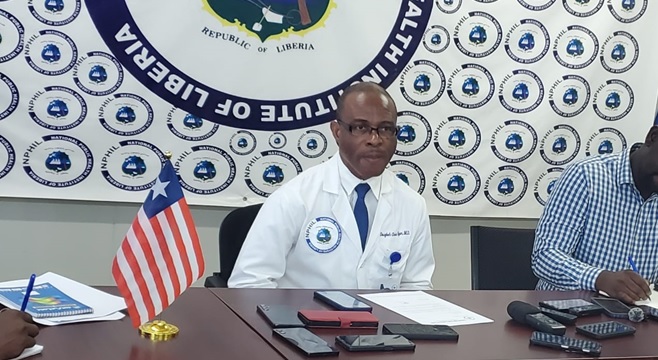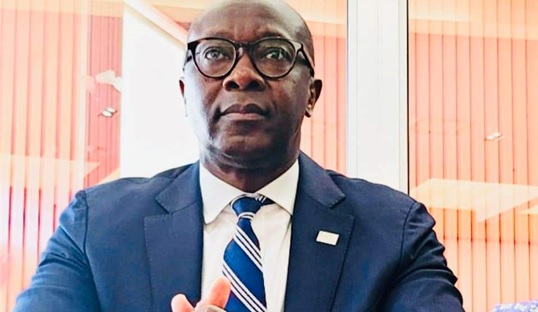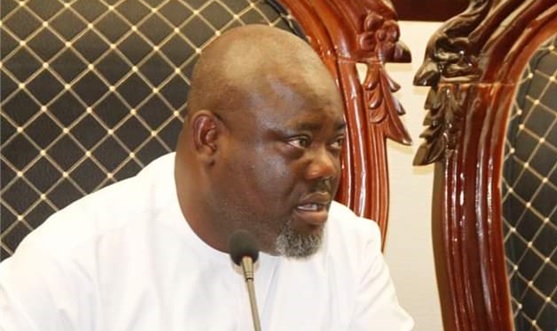MONROVIA – Dr. Dougbeh Chris Nyan, Director-General of the National Public Health Institute of Liberia (NPHIL), addressed journalists on Wedesday, December 11, 2024, during a press conference at NPHIL’s headquarters in Congo Town, Monrovia, providing updates on the Mpox outbreak and other public health challenges. Since its announcement as a health emergency of continental concern by the Africa CDC in August 2024, Liberia has managed a total of 63 confirmed Mpox cases. Out of these, 27 individuals have recovered, and current case numbers have reduced significantly, demonstrating the country’s ability to respond effectively despite limited resources.
Dr. Nyan commended the cooperation between NPHIL and the media for disseminating accurate information, which he credited as critical in combating misinformation and promoting public awareness. He emphasized the need for continued collaboration, noting that public health communication is crucial in preventing panic and ensuring an informed public. “When we provide you these briefings, we try to make them as simple as possible so that all of us can understand,” he said, highlighting efforts to explain technical terms in accessible language for the broader population.
Liberia’s handling of the Mpox outbreak has been acknowledged by international organizations such as the World Health Organization (WHO) and the West Africa Health Organization (WAHO). Dr. Nyan attributed this success to the dedication of NPHIL and its Incident Management System (IMS), which have worked tirelessly to manage cases, improvise in the absence of sufficient resources, and ensure better patient outcomes. He also lauded the risk communication strategies that have kept the public accurately informed and ensured transparency throughout the outbreak response.
Highlighting the critical role of diagnostics in managing infectious diseases, Dr. Nyan explained the process of identifying suspected, probable, and confirmed Mpox cases. He noted that Liberia has embraced advanced diagnostic tools, including molecular and serological tests, to accurately identify and monitor cases. These tools have not only improved case detection but also positioned Liberia as a leader in public health response in the region.
The NPHIL is now turning its attention to securing vaccines for Mpox under emergency use authorization. Dr. Nyan explained the science behind these vaccines, emphasizing the rapid advancements in vaccine production using mRNA technology. He highlighted how the global response to COVID-19 accelerated vaccine development processes and allowed for quicker interventions during outbreaks. Although Liberia faces logistical challenges in vaccine distribution, efforts are underway to meet international standards and secure necessary supplies.
Dr. Nyan shared NPHIL’s broader vision to establish research and development capabilities for diagnostic tools and vaccines in Liberia. He emphasized the importance of local innovation, stating that the country aims to produce its own solutions for diseases such as Lassa fever, Ebola, and malaria. This initiative will be supported through collaborations with renowned institutions like the Noguchi Memorial Institute for Medical Research and the Pasteur Institute.
Liberia’s advancements in genomic sequencing have also been a significant milestone. Dr. Nyan revealed that the country has acquired state-of-the-art sequencing technology, which enables scientists to analyze complex pathogens with precision. This capability has already been used to compare genetic sequences of Lassa fever samples with data from the United States, further strengthening Liberia’s scientific contributions.
In addition to Mpox, Liberia has been managing outbreaks of other diseases, including Lassa fever. Dr. Nyan disclosed that out of 231 suspected Lassa fever cases, 39 have been confirmed positive. He clarified that while some samples tested negative, the advanced sequencing tools will help identify other potential pathogens, ensuring that no case is overlooked. This comprehensive approach underscores Liberia’s commitment to maintaining a robust public health system.
Dr. Nyan also addressed concerns about Haemorrhagic fevers in neighboring Sierra Leone. He explained how regional cooperation and data-sharing mechanisms have enhanced disease surveillance and transparency. Liberia’s vigilant monitoring system has proven crucial in detecting and responding to potential cross-border threats, reflecting the country’s readiness to tackle regional health challenges.
Acknowledging the challenges posed by resource limitations, Dr. Nyan emphasized the importance of international partnerships in bolstering Liberia’s public health infrastructure. Organizations such as the Africa CDC, U.S. CDC, and UNICEF have provided critical support, enabling Liberia to strengthen its laboratory and diagnostic capacities. These partnerships have positioned the country as a regional leader in outbreak response and scientific innovation.
Dr. Nyan highlighted the need for Africa to prioritize research and development on the continent. He called for the establishment of local manufacturing facilities to produce vaccines and diagnostics, reducing dependency on external suppliers. “Africa now wants to take research and development out of the sky… right on the African continent,” he stated, signaling a transformative shift in public health strategy.
The press conference also shed light on Liberia’s role in advancing public health technology. Dr. Nyan noted that NPHIL is training scientists on cutting-edge sequencing platforms to enhance their ability to analyze complex pathogens. This initiative is expected to further Liberia’s contributions to global health security and ensure that the country remains at the forefront of scientific innovation.
Reflecting on the progress made since NPHIL’s establishment, Dr. Nyan celebrated the institute’s achievements in placing Liberia on the map of genomic sequencing. He shared an anecdote from an international conference where Liberia was recognized for its advancements, symbolizing the country’s growing prominence in global public health.
As Liberia continues to address multiple public health challenges, Dr. Nyan reiterated the importance of sustained collaboration, innovation, and investment. He praised the resilience of NPHIL staff and partners, who have worked tirelessly to improve health outcomes for Liberians. “We are responding to multiple outbreaks, not just Mpox,” he said, highlighting the institute’s comprehensive approach to managing infectious diseases.
Dr. Nyan concluded by thanking the media and the public for their role in promoting accurate information and fostering trust in public health interventions. He emphasized that communication remains a cornerstone of Liberia’s public health success, urging all stakeholders to remain vigilant and committed to safeguarding the nation’s health.







